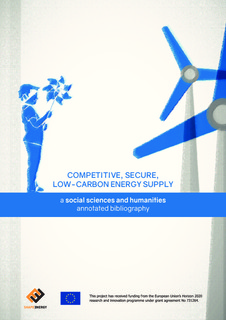| dc.description.abstract | The challenge: European Union (EU) energy policies have three main aims: competitiveness, secure supply and sustainability. EU countries have agreed to reduce greenhouse gas emissions by 40% compared to 1990, and to increase the share of renewable energy to 27%, by 20301.
Transitions to low-carbon societies in Europe are challenging and require substantial change in how we produce and use energy. The Horizon 2020 energy work programme2 emphasises the importance of research and innovation for supporting these transitions.
The aim: European energy policy has so far mainly relied on research from Science, Technology, Engineering and Mathematics (STEM) disciplines. Energy-related Social Sciences and Humanities (energy-SSH) have been significantly underrepresented. This annotated bibliography showcases the diversity of energy-SSH research of relevance to competitive, secure, low-carbon energy supply in Europe. It aims to demonstrate the policy relevance of energy-SSH to support low-carbon energy transitions in Europe.
Coverage: As well as providing an overview of high impact research, such as from the Economics domain, this bibliography also highlights so far underrepresented disciplines, such as Ethics and History.
The research presented in this bibliography has a clear bias towards Western and Northern European based researchers mirroring the dominance of these regions in overall energy-SSH. However, case studies from Southern and Eastern Europe have intentionally been added.
To ensure the representation of different SSH perspectives, the main topics of the bibliographies are politics, publics, and markets for competitive, secure, low-carbon energy. Further, it addresses the role of research on energy histories and energy futures.
Key findings: Economics dominate energy-SSH research, both in terms of impact in academia and influence on policymaking. Other, still underrepresented, disciplines provide valuable and policy-relevant insights on issues such as energy ethics; histories of energy; the role of visions, imaginaries and expectations for policymaking; and public engagement with low-carbon energy.
Transitions towards low-carbon energy systems are of significant interest to energy-SSH researchers, in terms of both how transitions happen and how to manage and govern them. The ‘Multi-Level Perspective’ has become a dominant framework to describe transitions. Much focus is also on studying ‘green niche’ initiatives. SSH research emphasises the importance of better understanding politics and power in sustainability transitions. More research is also needed on the established actors involved in current energy systems and their role in changing policies and practice.
Rather than a sole focus on specific renewable energy technologies, SSH researchers highlight the relevance of broader innovations that include the public and citizen initiatives. Such research on ‘publics’ often emphasises the need for a better understanding of how to engage publics in low-carbon energy transitions. Further, there is a need to discuss the actors and processes responsible for engaging citizens in both renewable energy projects and the development of new technologies. Energy justice is also an important, though understudied, topic in this context | nb_NO |
